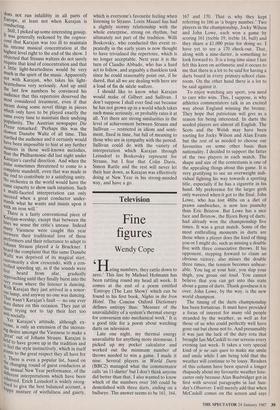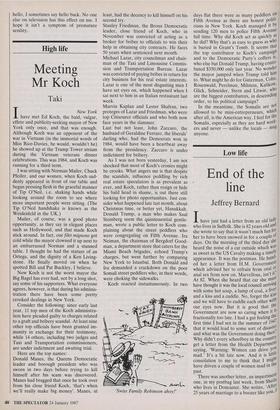Television
Fine figures
Wendy Cope
Hating numbers, they rattle down to zero.' This line by Michael Hofmann has been rattling round my head all week. It comes at the end of a poem entitled `Entropy (The Late Show)' which can be found in his first book, Nights in the Iron Hotel. The Concise Oxford Dictionary defines entropy thus: 'Measure of the unavailability of a system's thermal energy for conversion into mechanical work.' It is a good title for a poem about watching darts on television.
Late one night, my thermal energy unavailable for anything more strenuous, I picked up my pocket calculator and worked out the minimum number of throws needed to win a game. I made it nine. Several players in World Darts (BBC2) managed what the commentator calls 'an 11-darter' but I don't think anyone did better than that. I also wanted to know which of the numbers over 160 could be demolished with three darts, ending on a bullseye. The answer seems to be 161, 164, 167 and 170. That is why they kept referring to 166 as 'a bogey number.' Two players in the championship, Jocky Wilson and John Lowe, each won a game by scoring 161 (treble 19, treble 18, bull) and they share a £1,000 prize for doing so. I have yet to see a 170 check-out. That, along with a nine-darter, is something to look forward to. It is a long time since I last felt this keen on arithmetic and it occurs to me that there is a lot to be said for having a darts board in every primary-school class- room. On the other hand there is a lot to be said against it.
To enjoy watching any sport, you need to care who wins. This, I suppose, is why athletics commentators talk in an excited way about England winning the bronze. They hope that patriotism will give us a reason for being interested. In darts the seeded players are almost all English. The Scots and the Welsh may have been rooting for Jocky Wilson and Alan Evans but the rest of us needed to choose our favourites on some other basis than nationality. I decided to support the fatter of the two players in each match. The shape and size of the contestants is one of the appealing things about this game. It is very gratifying to see an overweight indi- vidual fighting his way towards a sporting title, especially if he has a cigarette in his hand. My preference for the larger girth only wavered when it got to the final. John Lowe, who has lost 481bs on a diet of prawn sandwiches, is now less paunchy than Eric Bristow. But Lowe has a nice face and Bristow, the Bjorn Borg of darts, had already won the championship five times. It was a great match. Some of the most enthralling moments in darts are those when a player does the kind of thing you or I might do, such as missing a double five with three consecutive throws. If his opponent, stepping forward to claim an obvious victory, also misses the double three times, the tension becomes unbear- able. You tug at your hair, you slap your thigh, you groan out loud. You cannot believe that you can get into this state about a game of darts. Thank goodness it is over. John Lowe, by the way, is the new world champion.
The timing of the darts championship has been fortuitous. It must have provided a focus of interest for many old people stranded by the weather, as well as for those of us who could perfectly well have gone out but chose not to. And presumably it was just the luck of the duty rota that brought Ian McCaskill to our screens every evening last week. It takes a very special kind of je ne sais quoi to make me smile and smile while I am being told that the weather will continue to be lousy. Readers of this column have been spared a longer rhapsody about my favourite weather fore- caster only because Alan Rusbridger got in first with several paragraphs in last Sun- day's Observer. I will merely add that when McCaskill comes on the screen and says hello, I sometimes say hello back. No one else on television has this effect on me. I hope it isn't a symptom of premature senility.



















































 Previous page
Previous page